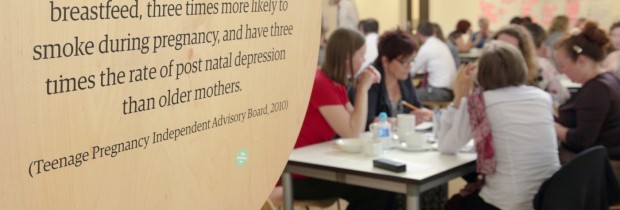Stop, look, listen. Then GO
deliberate
verb
dɪˈlɪbəreɪt/
1. engage in long and careful consideration.
“she deliberated over the menu”
We’ve spent the last few months bringing disruption to the early years system in Essex: generating new insights through ethnographic research, helping colleagues look afresh at what’s going on with a multiple cause analysis, and reflecting differently on local data and evidence. New insights and perspectives enable new possibilities to emerge – a thousand flowers get germinating in an exciting way. But we don’t want to actually develop loads of new ideas; when addressing complex public service challenges it’s critical to narrow things down to a small set of focused priorities on which you can execute.
So yesterday Essex colleagues gathered for Deliberation Day: the mid point in a review of the Early Years system commissioned by Dave Hill, the Executive Director for People Commissioning, and led by Chris Martin, Integrated Commissioning Director. In a wonderful space at Zinc Arts, we curated a space and time for consideration, deliberation, and voting. And stickers.
Deliberation refers to the the process of thoughtfully weighing options, usually prior to voting. It is a conscious, intentional activity, and we designed yesterday’s D-Day as an immersive experience to help colleagues from across Essex pause, consider what they have learnt through their Early Years (EY) Review, and select a number of priority actions for transforming outcomes for children and families.
We had planned a rather ambitious process (9-4.30pm) which involved:
- Getting participants to engage with and (crucially – insert stickers here) respond to the range of insights and evidence developed in the EY review, presented visually and boldly. This included: a wide range of data and evidence from Essex and beyond, horizon scanning examples and reflections, ethnographic insights, and collated material from previous interactive workshops;
- Peer reviewing (reading, sharing, scoring and assessing) 22 initial ideas for innovation, selecting those to be developed further, those to be dropped, and making connections and improvements;
- Provocation from outside experts who brought real challenge and created focus (a huge thank you to friends at Futuregov; One Plus One, Design Council and Parents 1st for their top quality input)
- Further developing 9 selected ideas, with advice and questioning from ThePublicOffice team and external provocateurs
- Mapping the shortlisted ideas according to their level of ‘radicalness’ and ‘system-wide impact’
What was quite remarkable about the day was the degree of commitment, energy and focus from everyone in the room. This wasn’t an easy day out of the office, but a real chance to work hard on important stuff alongside colleagues – all with the support of expert ‘outsiders’. What could have failed miserably as an event design worked, because everyone in the room trusted the process, trusted each other, and worked (really , really) hard.
And if we were worried at 4.30pm that people were exhausted, we needn’t have. If the quality of an event can be judged in part by how many people hang around after it officially finishes to talk and make plans, then this was a good one.
Every element of the journey we are on with Essex feels momentous, but we are acutely aware of the challenges of implementation – moving from selecting ideas for innovation to refining them further and making them happen – ensuring they add up to something that makes a difference to families. That’s where we’re off to now….
